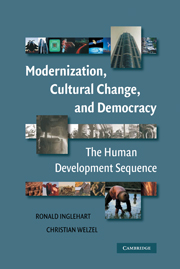Book contents
- Frontmatter
- Contents
- Dedication
- Acknowledgments
- Foreword by Hans-Dieter Klingemann
- Introduction
- PART I THE FORCES SHAPING VALUE CHANGE
- PART II THE CONSEQUENCES OF VALUE CHANGE
- 7 The Causal Link between Democratic Values and Democratic Institutions: Theoretical Discussion
- 8 The Causal Link between Democratic Values and Democratic Institutions: Empirical Analyses
- 9 Social Forces, Collective Action, and International Events
- 10 Individual-Level Values and System-Level Democracy: The Problem of Cross-Level Analysis
- 11 Components of a Prodemocratic Civic Culture
- 12 Gender Equality, Emancipative Values, and Democracy
- 13 The Implications of Human Development
- Conclusion: An Emancipative Theory of Democracy
- Bibliography
- Index
9 - Social Forces, Collective Action, and International Events
Published online by Cambridge University Press: 05 September 2012
- Frontmatter
- Contents
- Dedication
- Acknowledgments
- Foreword by Hans-Dieter Klingemann
- Introduction
- PART I THE FORCES SHAPING VALUE CHANGE
- PART II THE CONSEQUENCES OF VALUE CHANGE
- 7 The Causal Link between Democratic Values and Democratic Institutions: Theoretical Discussion
- 8 The Causal Link between Democratic Values and Democratic Institutions: Empirical Analyses
- 9 Social Forces, Collective Action, and International Events
- 10 Individual-Level Values and System-Level Democracy: The Problem of Cross-Level Analysis
- 11 Components of a Prodemocratic Civic Culture
- 12 Gender Equality, Emancipative Values, and Democracy
- 13 The Implications of Human Development
- Conclusion: An Emancipative Theory of Democracy
- Bibliography
- Index
Summary
We have just seen strong evidence that mass self-expression values promote the emergence and effectiveness of democracy. But cultural changes by themselves are not the entire story. For example, one could argue quite plausibly that the Third Wave of democratization would never have occurred, if Mikhail Gorbachev had not abolished the Brezhnev doctrine, and unless the United States had supported democratization in such countries as the Philippines and South Korea. For democratization is not brought about by impersonal mass tendencies, such as self-expression values, but by collective actions in which specific actors, including elites and counterelites, play the key roles.
It would be absurd to argue that cultural changes automatically produce institutional changes such as democratization, but they do seem to be an important contributing factor. The question is, How do rising self-expression values interact with elite-level events, such as Gorbachev's decision not to intervene militarily in Eastern Europe to prop up tottering communist regimes, in bringing about and strengthening democracies? To answer this question, we must deal with three types of causal factors (see Tilly, 1984).
First, changing international circumstances, exemplified by such events as the Washington consensus or the end of the Brezhnev doctrine, play key roles in launching international waves of democratization (Pridham, 1991; L. Diamond, 1993a; W.-I. Robinson, 1996; Markoff, 1996; Whitehead, 1996). The impact of these international events is obvious to anyone who has dealt with questions of democratization, but they are only part of the story.
- Type
- Chapter
- Information
- Modernization, Cultural Change, and DemocracyThe Human Development Sequence, pp. 210 - 230Publisher: Cambridge University PressPrint publication year: 2005



